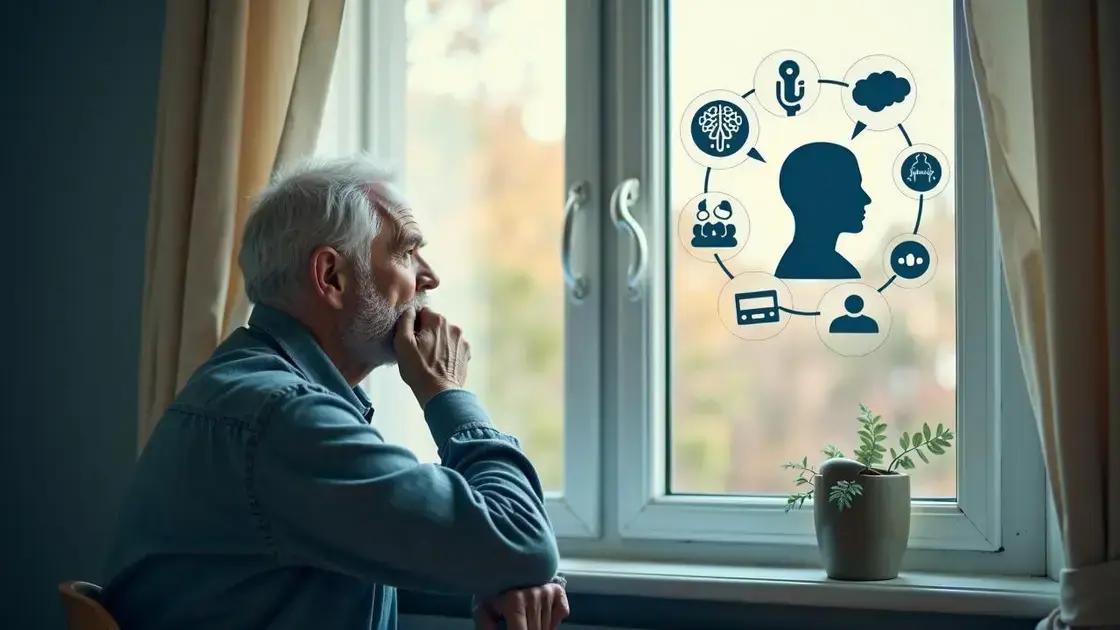Mental health screenings are vital for men over 50, providing early detection of issues like depression and anxiety, personalized treatment plans, and improved quality of life. Regular screenings help raise awareness and reduce stigma, allowing older men to seek help and maintain their mental well-being.
Mental health is essential for everyone, particularly for men over 50. As men age, they may face unique challenges that affect their mental well-being, such as retirement, loss of loved ones, and health issues. Understanding the importance of mental health screenings can pave the way for better emotional resilience and overall health. In this article, we’ll delve into the critical aspects of mental health for older men, including the benefits of regular screenings, common issues they may face, and practical tips for approaching these important evaluations.
Understanding Mental Health in Men Over 50

Understanding mental health in men over 50 is vital as it can influence their overall quality of life. As men age, they may encounter various emotional and psychological challenges, often exacerbated by life changes such as retirement or the loss of loved ones. Recognizing these challenges early can lead to better management and improved mental health.
Key Factors Influencing Mental Health
Several factors can impact mental health in older men, including:
- Biological changes: Hormonal shifts and neurological changes that occur with age can influence mood and behavior.
- Social isolation: Many men find themselves socially isolated in their later years, leading to feelings of loneliness and depression.
- Loss and grief: Experiencing the death of loved ones can trigger profound grief, affecting mental well-being.
- Chronic health issues: Conditions like diabetes, heart disease, or cognitive decline can contribute to anxiety and depression.
The Importance of Awareness
It’s crucial for men over 50 to be aware of these risks. Increased awareness can empower them to seek help or support when needed. Engaging in discussions about mental health can reduce stigma and promote better emotional well-being. Additionally, encouraging open conversations among peers can foster a supportive community where men feel comfortable sharing their experiences.
Recognizing Warning Signs
Men should be vigilant for warning signs that could indicate declining mental health, such as:
- Persistent sadness or low mood
- Withdrawal from social activities
- Difficulty concentrating or making decisions
- Increased irritability or mood swings
- Changes in sleep patterns or appetite
If any of these signs are present, it’s essential to consider seeking a mental health screening or consulting a healthcare professional.
Benefits of Regular Screenings

Regular mental health screenings are crucial for men over 50, offering various benefits that significantly impact their lives. Early detection of mental health issues can lead to prompt treatment, improving overall quality of life. Here are some key benefits of these screenings:
1. Early Detection of Issues
Timely identification: Regular screenings allow for the early detection of conditions such as depression, anxiety, or cognitive decline. Early intervention can prevent these issues from becoming severe.
2. Personalized Treatment Plans
Through screenings, healthcare professionals can create tailored treatment plans based on each individual’s needs, ensuring more effective management of mental health.
3. Reducing Stigma
Participating in screenings can contribute to reducing the stigma associated with mental health. When more men engage in these conversations, it encourages others to seek help as well.
4. Improved Relationships
Better communication: Regular check-ups on mental health can enhance interpersonal relationships. Men who are mentally healthy and aware are better equipped to communicate and build strong connections with family and friends.
5. Enhanced Quality of Life
Overall, regular mental health screenings help improve the quality of life for men over 50 by fostering emotional stability, reducing feelings of loneliness, and encouraging healthier lifestyle choices.
Common Mental Health Issues in Older Men

Older men often face specific mental health issues that can affect their daily lives. Understanding these common challenges is essential for promoting awareness and encouraging screenings. Here are some of the most prevalent mental health issues among older men:
1. Depression
Depression is a common issue that can arise due to various factors, such as loss, loneliness, or health problems. Symptoms include persistent sadness, loss of interest in activities, and changes in sleep or appetite.
2. Anxiety Disorders
Anxiety disorders can affect older men in different ways. They may experience excessive worry about health, finances, or family. Physical symptoms can include a racing heart, sweating, or trouble concentrating.
3. Cognitive Decline
Cognitive decline can manifest as difficulty remembering information or making decisions. Conditions like Alzheimer’s disease and other forms of dementia are more common in older men and significantly impact their mental health.
4. Substance Abuse
Some older men may use alcohol or prescription medications to cope with stress or sadness, leading to substance abuse issues. It’s crucial to address these behaviors early to receive appropriate support.
5. Suicide Risk
The risk of suicide is higher in older men, often linked to untreated depression, loneliness, or chronic illness. Recognizing warning signs is vital, and seeking help should be a priority.
6. Adjustment Disorders
Life changes, such as retirement or health declines, can trigger adjustment disorders. Symptoms may include anxiety, depression, and difficulty coping. Regular screenings can help identify these issues early.
How to Approach Mental Health Screenings

Approaching mental health screenings can feel daunting, but it is a straightforward process that can lead to better well-being. Here are some tips on how to make the process easier:
1. Acknowledge Your Feelings
Recognizing the importance of mental health is the first step. Whether you are feeling anxious, sad, or overwhelmed, acknowledging these feelings can help you take action.
2. Schedule an Appointment
Find a healthcare provider you trust and schedule a screening appointment. This can be a doctor, therapist, or counselor who specializes in mental health. You can ask for recommendations from friends or family.
3. Prepare for the Screening
Before your appointment, it can be helpful to write down your symptoms, concerns, and any questions you have. This prepares you for the discussion and helps the healthcare provider understand your needs better.
4. Be Honest and Open
During the screening, it’s important to be honest and open about your feelings and experiences. This allows the provider to assess your mental health accurately and recommend the appropriate support.
5. Discuss Next Steps
After the screening, talk about the next steps with your healthcare provider. This could include treatment options, therapy, or further evaluations. Knowing what to expect can make the process less overwhelming.
6. Follow Up
After your screening, don’t forget to schedule follow-up appointments as needed. Regular check-ins can help track your progress and adjust treatments as necessary.
7. Involve Loved Ones
If you feel comfortable, involve family members or friends in the process. They can provide support and encouragement throughout your mental health journey.
In Summary: Embracing Mental Health Screenings for Men Over 50
Mental health is a critical aspect of overall well-being, especially for men over 50. By understanding the importance of mental health screenings, recognizing common mental health issues, and knowing how to approach these screenings, older men can take proactive steps towards better emotional health.
Regular screenings offer numerous benefits, such as early detection, personalized treatment, and improved quality of life. It is essential to acknowledge feelings, seek help, and engage in open conversations about mental health to reduce stigma and foster support.
Ultimately, taking action by scheduling screenings and being open about mental health can lead to a healthier, more fulfilling life.
FAQ – Frequently Asked Questions about Mental Health Screenings for Men Over 50
What are mental health screenings?
Mental health screenings are assessments that help identify signs of mental health issues, allowing for early intervention and support.
Why are mental health screenings important for men over 50?
They help detect conditions like depression or anxiety early, leading to better management and improving overall quality of life.
How often should men over 50 get screened for mental health issues?
It’s recommended to have screenings at least once a year, or more frequently if experiencing concerning symptoms.
What should I expect during a mental health screening?
You will answer questions about your emotions, behaviors, and lifestyle. The process is usually straightforward and confidential.
Can I bring someone to my screening appointment?
Yes, having a trusted friend or family member can provide support and help you feel more comfortable during the process.
What are common mental health issues in older men?
Common issues include depression, anxiety disorders, cognitive decline, and substance abuse. Early detection through screenings can help manage these conditions.













